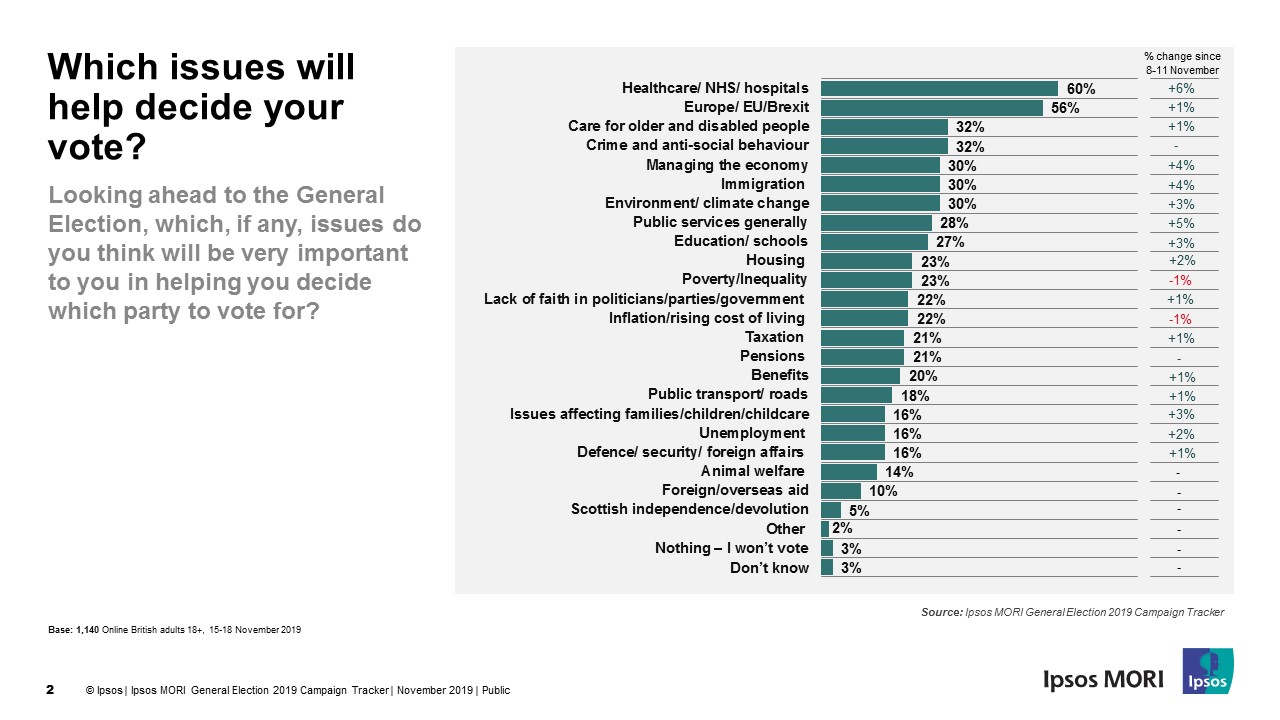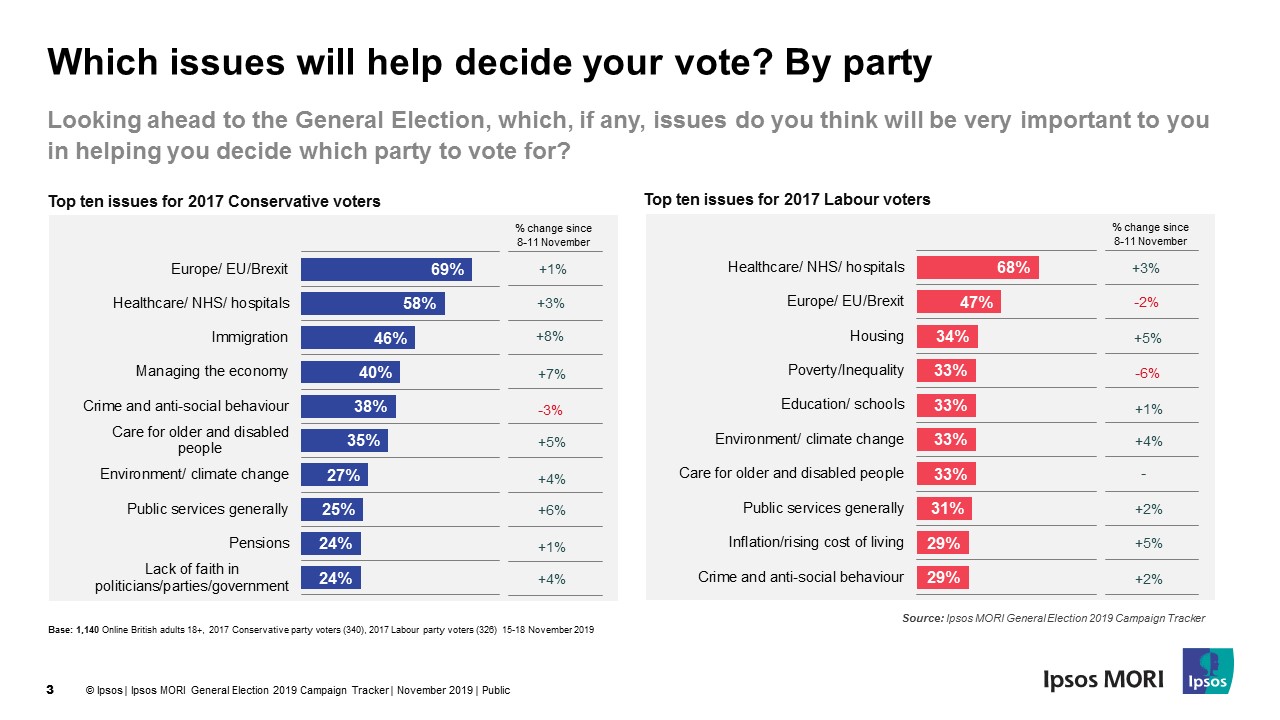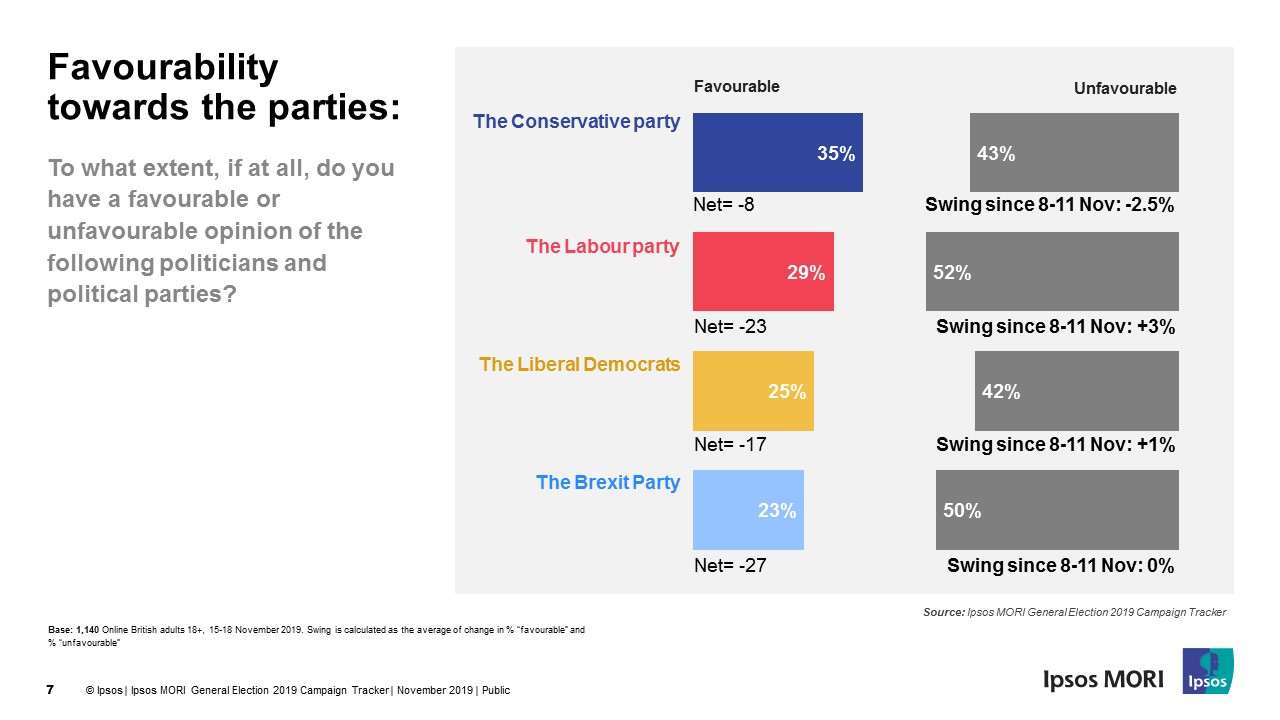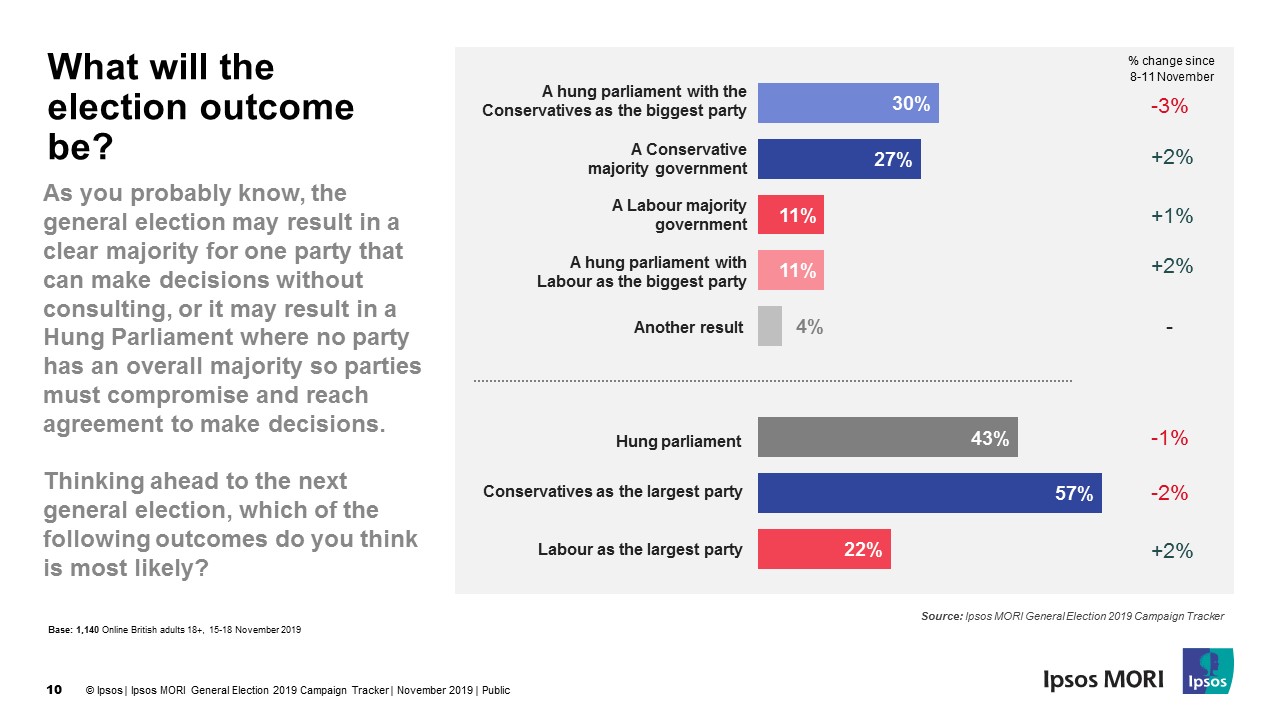NHS leads as top election issue with Conservatives still expected to be the largest party
Ipsos's latest campaign tracker shows the NHS has overtaken Brexit as the most important issue for GB adults
- The NHS overtakes Brexit as the most important issue for GB adults
- Favourability towards Labour improves slightly since week one but 6 in 10 still unfavourable towards Corbyn
- Majority of GB adults still expect Conservatives to be largest party after election – either in majority government or as largest party in a hung parliament
Issues deciding your vote
- When prompted with a list of issues that might be important to them in deciding how to vote in the upcoming election, the top two issues for GB adults are the NHS (60%) and Brexit (56%). The proportion of GB adults choosing the NHS has increased 6 points since last week, now putting it narrowly in first place ahead of Brexit.

- Crime (32%) and caring for older and disabled people (32%) are vying for third place. Several other issues have grown in importance by a few percentage points since last week, notably managing the economy (+4pts), immigration (+4pts) and public services generally (+5 pts).
- For 2017 Conservative voters, the top four issues are Brexit (69%), the NHS (58%), immigration (46%) and managing the economy (40%).
- For 2017 Labour voters, the NHS is still the number one issue (68%), followed by Brexit (47%) and housing (34%), which has risen 5 points since last week.
- For leave voters, the NHS has risen 7-points, with over three in five (62%) prioritising it, meaning it is now closely behind Brexit (63%). Among Remain voters, the NHS (64%) still leads Brexit (59%) with a range of issues further behind.
- When asked which party has the best policies on the issues that matter most to them, 26% of GB adults overall said the Conservatives (unchanged since last week), while 22% said Labour (up 3%). One in ten (9%) said the Liberal Democrats, 6% said the Brexit Party, 3% said the Greens and 2% said the SNP. Meanwhile, 11% said different parties were better on different policies, 8% said ‘none of these’ and 11% said that they didn’t know.
- Remain voters were most likely to say the Labour Party (31%) had the best policies on the issues they cared about, with fewer than one in five (18%) saying the Liberal Democrats. Leave voters were most likely to say the Conservatives (42%) had the best policies on the issues that mattered to them.

Favourability towards parties and their leaders
- Favourability towards the Labour Party has improved slightly since last week with 29% of GB adults now saying they have a favourable opinion (compared to 26% last week). The Conservatives are still seen as the most favourable party (35%), while around one in four say they have a favourable opinion of the Liberal Democrats (25%) and Brexit Party (23%).
- In contrast, 43% have an unfavourable opinion of the Conservative Party compared with 52% that have an unfavourable opinion of Labour (although this has improved from 55% last week). 50% are unfavourable towards the Brexit Party and 42% the Lib Dems – all of which are relatively unchanged since last week.
- Overall in terms of ‘net favourability’ the Conservative still lead on -8 but this has dropped 5 points since last week, while Labour are now on -23 (up 6 points). Meanwhile, the Liberal Democrats (-17) and Brexit Party (-27) have not seen notable shifts.
- Leave voters are most favourable towards the Conservatives (55%), compared to 45% for the Brexit Party, 14% for Labour and 9% for the Liberal Democrats.
- Remain voters are now most favourable towards the Labour party (43%), who have risen five percent and overtaken the Liberal Democrats (41%). Both have a significant lead over the Conservatives (23%) and Brexit Party (4%).

- Turning to party leaders, GB adults are still most favourable towards Boris Johnson of the four party leaders included in the survey. 36% are favourable towards the Prime Minister, with 45% unfavourable, giving a net favourability score of -9 (little change since last week). 59% of Leave voters are favourable towards Johnson.
- In contrast, of the four leaders, British adults are least favourable towards Jeremy Corbyn, who has not seen any improvement in his ratings: 22% favourable, 60% unfavourable, net -38. This compares to scores of 23% favourable and 62% unfavourable last week (net -39). Nearly a majority of Remain voters (49%) are still unfavourable towards Corbyn
- 22% are favourable towards Lib Dem leader Jo Swinson, 41% unfavourable, net -19.
- 26% are favourable towards Brexit Party leader Nigel Farage, 54% unfavourable, net -28.
Who is having a good campaign?
British adults are more likely to think each of the Conservatives, Labour, Liberal Democrats and the Brexit Party are having a bad campaign than having a good campaign.
- The Conservatives have seen no movement over the past week, with 27% still saying they think they are having a good campaign, 35% saying a bad campaign. Net -8.
- Perceptions of the Labour party campaign have improved slightly, with now one in four (25%, +4pts from last week) saying they are having a good campaign and 42% (-2pts) saying a bad campaign. Net -17 (up from -23).
- 20% think the Lib Dems are having a good campaign and 33% think they are having a bad campaign. Net -13 (down three points)
- 19% think the Brexit Party are having a good campaign, 41% a bad campaign. Net -22 (down four points).
What will the election outcome be?
- The past week of campaigning has done little to change expectations of the result, with the majority (57%) still predicting the Conservatives will be the largest party (down 2 pts). However, they are more divided on whether this will be a Conservative majority government (27%) or a hung parliament with Conservatives as the biggest party (30%). Over a third (36%) of 2017 Labour voters expect the Conservatives to be the largest party and four in five (80%) 2017 Conservative voters think the same.
- In contrast, one in five British adults (22%) expect Labour to be the largest party with 11% predicting a majority Labour government and 11% a hung parliament with Labour as the largest party. Around half (51%) of 2017 Labour voters expect them to be the largest party after the election.

Commenting on the findings, Ipsos Research Director Keiran Pedley said:
Our campaign tracker shows that nothing has fundamentally changed in the second week of the campaign in terms of public opinion. There are some signs of Labour improving slightly, reflected in voting intention polls too, but they are still a long way off where they need to be to stop the Conservatives returning to office after the election. That being said, with three weeks to go, there is still time for Labour to turn things round following the upcoming manifesto launches and series of leaders’ debates.






